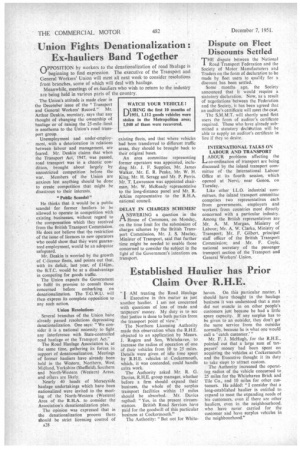Union Fights Denationalization : Ex-hauliers Band Together
Page 30

If you've noticed an error in this article please click here to report it so we can fix it.
nPPOS11-10N by workers to the denationalization of road haulage is beginning to find expression. The executive of the Transport and General Workers' Union will meet all next week to consider resolutions from branches, some of which will deal with haulage.
Meanwhile, meetings of ex-hauliers who wish to return to the industry are being held in various parts of the country.
The Union's attitude is made clear in the December issue of the "Transport and General Workers' Record." Mr. Arthur Deakin, secretary, says that any thought of changing the ownership of haulage or of raising the 25-mile limit is anathema to the Union's road transport group.
Unemployment and under-employment, with a deterioration in relations between labour and management, are feared. Mr. Deakin claims that when the Transport Act, 1947, was passed, road transport was in a chaotic condition, brought about largely by unrestricted competition before the war. Members of the Union are anxious lest anything should be done to create competition that might be disastrous to their interests.
"Public Scandal" He thinks that it would be a public scandal for former hauliers to be allowed to operate in competition with existing businesses, without regard to the compensation which they received from the British Transport Commission. He does not believe that the restriction of the issue of licences to new operators who could show that they were guaranteed employment, would be an adequate safeguard.
Mr. Deakin is worried by the growth of C-licence fleets, and points out that, with its deficit, last year, of 1.141m., the B.T.C. would be at a disadvantage in competing for goods traffic.
The Union expects the Government to fulfil its promise to consult those concerned before embarking on denationalization. The T.G.W.U. will then express its complete opposition to any such action.
Union Resolutions Several branches of the Union have already passed resolutions deprecating denationalization. One says: "We consider it is a national necessity to fight any interference with State-controlled road haulage or the Transport Act."
The Road Haulage Association is, at the same time, gathering its forces in support of denationalization. Meetings of former hauliers have already been held in the Western, Northern, West. Midland, Yorkshire (Sheffield), Southern and North-Western (Western) Areas, and alters are likely.
Nearly 40 heads of Merseyside haulage undertakings which have been nationalized were invited to the meeting of the North-Western (Western) Area of the &l-LA. to consider the Association's denationalization plan.
The opinion was expressed that in the denationalization process there should be strict licensing control of A28 existing fleets, and that where vehicles had been transferred to different traffic areas, they should be brought back to their original bases.
An area committee representing former operators was appointed, including Mr. J. F. Supplies, Mr. James Walker, Mr. E. R. Peake, Mr. W. H. King, Mr. H. Scragg and Mr. P. Perris. Mr. T. Lawrenson was appointed chairman, Mr. W. McReady representative tp the long-distance panel and Mr. R. Atkins representative to the R.H.A. national council.
DELAY IN CHARGES SCHEMES?
ANSWER1NG a question in the House of Commons, on Monday, on the time limit for the submission of charges schemes by the British Transport Commission, Mr. J. S. Maclay, Minister of Transport, said that further time might be needed to enable those concerned to consider the subject in the light of the Government's intentions ork transport.
Dispute on Fleet Discounts Settled
THE dispute between the National Road Transport Federation and the Society of Motor Manufacturers and Traders on the form of declaration to be made by fleet users to qualify for a discount has been settled.
Some months ago, the Society announced that it would require a statutory declaration. Now, as a result of negotiations between the Federation and the Society, it has been agreed that an auditor's certificate will meet the case.
The S.M.M.T, will shortly send fleet users the form of auditor's certificate required. Those who have already submitted a statutory declatation will be able to supply an auditor's certificate in lieu if they so desire.
INTERNATIONAL TALKS ON LABOUR AND TRANSPORT
LABOUR problems affecting the co-ordination of transport are being discussed by the inland transport committee of the International Labour Office at its fourth session, which opened at Nervi, near Genoa, on Tuesday.
Like other I.L.O. industrial committees. the inland transport committee comprises two representatives each from governments, employers and workers from countries most directly concerned with a particular industry. Among the British representatives are Mr. A. M. Morgan, Ministry of Labour; Mr. A. W. Clarke, Ministry of Transport; Mr. F. Gilbert, principal staff officer of the British Transport Commission; and Mr. F. Coyle, national secretary of the passenger transport section of the Transport and General Workers' Union.
































































































